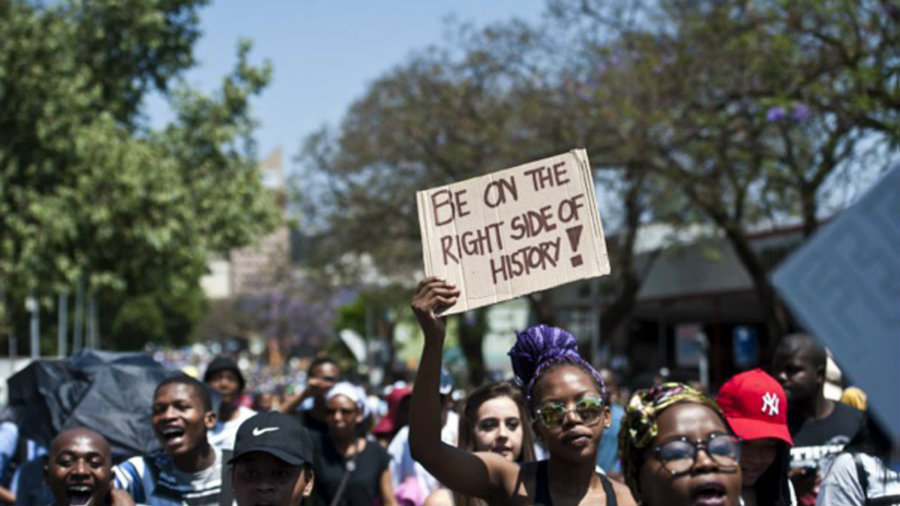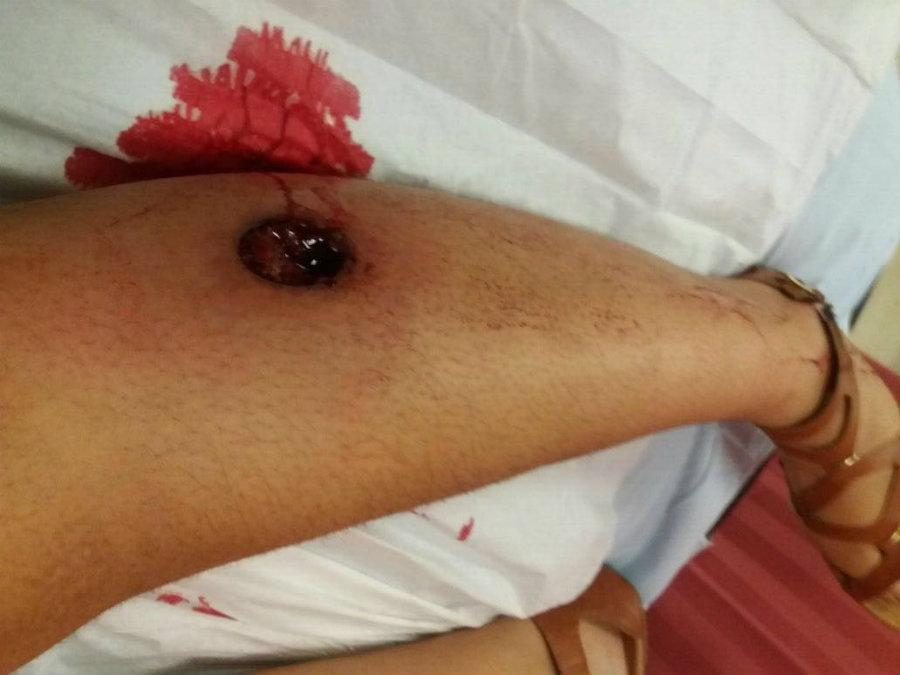Students at the University of KwaZulu-Natal (UKZN) in South Africa have once again been confronted by the violence that flared during protests.
Students have been demonstrating against the agreed 8 percent fee increase after the government had assured there would be no fee increment following the beginning of the #FeesMustFall Movement last year that took the South African nation and the world by storm. Also, students were demonstrating against the squalid conditions of their residences where they had paid for their accommodation but have been living with leaking water.

Protests turn rife at UKZN
Students have been protesting at the university’s Howard College campus from Monday into the night and early morning when six cars were set a light along with a library on campus. Security officials raided students’ accommodation, with a trigger-happy rage and forcefully removed them from their rooms. Some students hung from their windows daring police to get them. One female student was raped during these raids and had to wait for the next day to receive medical attention.
According to Mail and Guardian, a drama lecturer at the institution, Pumelela Nqelenga, posted on his Facebook page that “South African Police Services raped a student last night during the protest. We having been waiting for an ambulance since 8.30am […] So during the protest black women are being sexually assaulted.”
As many as 20 students were arrested on Tuesday morning. However, they were not in connection with the pyro-activities that had occurred. Students have been protesting for almost a month in relation to fee increases as well as other issues the Student Representative Council (SRC) had written in a memorandum presented to university management on Tuesday. An exam hall was burnt last week in Pietermaritzburg campus as well as a coffee shop at Howard College Campus.
The university had shut down on 15 August in response to talks of possible fee increases for the upcoming year. Then it re-opened on Wednesday, August 24 when the vice-chancellor released a communiqué suspending academic until Sunday, 28 August. However, in response to reports that vice-chancellors of different universities in the nation had agreed to a fee increment of 8 percent, students made a call to gather. According to South African state broadcaster SABC News, on Monday 5 September, UKZN Executive Director of Corporate Relations, Lesiba Seshoka, gave a statement saying that classes will continue despite the protest. The university management changed their mind when they heard about the real bullets police were using to pacify the students instead of rubber ones.
Police brutality targeting Black students
The SRC had reported that police were dispersing demonstrating students with actual bullets after a male student was shot in the shower on Monday and a female one on Tuesday morning. Neither of the students was part of the demonstrations. Images of the latter’s wound and video of her in pain while being carried by fellow students to receive medical attention went viral on Twitter. Many users made comparisons between today’s #FeesMustFall protests and those of the Soweto Uprising in 1976 when police opened fire on numerous black students protesting the apartheid regime. Police have denied the use of live ammunition on students.
In addition to the shooting, teargas, raiding and raping security forces have inflicted upon students, Times Live reported that a 20-year-old, female second-year music student named Michelle Mchunu said she and a few other students were chased into the bushes by police, who then hit them with batons. Pictures of the bruises on Mchunu’s elbows are circulating in the media as she protected her face with her arms.

In response to the damage done to various buildings on campus, the university obtained a court interdict to prohibit any form of gathering on campus. Infringing on students’ constitutional right to peacefully and unarmed assemble, demonstrate and/or picket. Amid all of the chaos that has been occurring at the University of KwaZulu-Natal, the Vice-Chancellor of the institution has yet to address the students.
This is not the first time students are outraged at the level of violence with which police retaliate. Since last year’s #FeesMustFall protests started, Twitter and Facebook have been exploding with posts, images and videos of police using unnecessary force against students, regardless of gender, violating their rights and liberties as South African citizens. In April this year, another case of police brutality erupted when students were protesting against rape on campus at Rhodes University when police used stun grenades and teargas to pacify them.
There have been an array of severe cases of police using brutal force as a chosen reaction to protesting students, however, most of which have only been captured on cell phones of bystanders and circulated on social media. Students are frustrated with the lack of support from mainstream media who fail to witness the degree of injustices and violence with which they are confronted by the same people who are hired to protect them.
Moreover, increased security on various South African university campuses has lead to Black female students complaining about sexually implicit and explicit comments they had received from the same security forces brought on campus to ensure they are far from harm’s way. The fact that at UKZN a female student was raped during the raids, and there has been no real coverage of the incident is truly alarming and exposes the cracks in South African society when it comes to the preservation of women’s rights. There is a prevailing rape culture in the country that beckons the question of how safe women are, especially black, when they are being threatened and violated by those who are supposed to uphold the law.
The gatherings and demonstrations that have been happening since 2015 are a clear indication that numerous South African students are frustrated with the lack of access they have to education. The degrading accommodation conditions in which some of them are expected to stay as well as the shadow of apartheid that still lingers in institutions of learning where African students are still fighting 22 years after freedom for their decolonisation.
Source: Times Live
